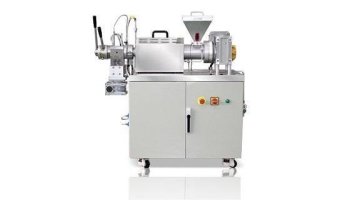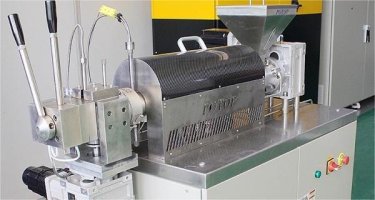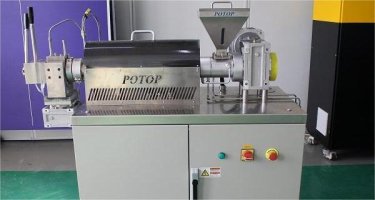Plastics melt filtration stress value tester for lab
Overview
Products Features
1. Selection and evaluation of filter media. By testing the filtration performance of different media, we can select the media with the best filtration pressure and filtration accuracy, and provide the best filtration solution for production.
2. Media development and optimization. Filter media manufacturers can evaluate the filtration performance of newly developed filter media through filtration tests, find out the key factors affecting the filtration performance, and continuously optimize and improve the formulation and process of filter media to improve its filtration accuracy and economy.
3. Determination of process parameters. Through filtration tests, the best filtration process parameters can be determined, such as filtration area, filtration flux, number of filtration layers, number of filtration cycles, etc., to improve filtration efficiency and reduce energy consumption.
4. Selection of filtration equipment. According to the filtration test results, we can select the filtration equipment that matches the filtration area and filtration precision to ensure that its processing capacity meets the requirements of the production process and to avoid the filtration link becoming a bottleneck in the production.
5. Reference for quality control. Regular filtration tests are conducted on the production of filter media and finished products to monitor the changes in their filtration performance and to identify problems for timely improvement to ensure stable and uniform product quality.
6. Troubleshooting and treatment. When the filter system is blocked or poorly filtered, the filter media and process can be tested to find the cause of the problem and take the correct solution to reduce production losses.
7. New product development support. In the process of developing new products, filtration testing can provide an important reference for the screening, selection and optimization of the product process to ensure that the finalized process parameters meet the product quality requirements.
Products Advantages
1. High testing precision. High precision pressure sensors and flow metres are used in the filtration process to reliably monitor minor pressure and flow changes, ensuring accurate and dependable test results.
2. Significant automation. Most products use a PLC control system or a computer control system to conduct the filtration testing procedure automatically, decreasing human errors and increasing testing efficiency.
3. Broad applicability. The filtering cell and fixture have a universal structure that can test various filter and membrane specifications to fulfil the diverse testing needs of different clients.
4. Actual process simulation. Some of the items have a heating system that may be used for filtering tests at high temperatures and pressures, replicating the actual plastic processing process and producing accurate and trustworthy test results.
5. It is simple to use. The device has a user-friendly design and a simple and straightforward software interface, so you can rapidly master the operating method and finish the test without expert training.
6. Take into account after-sales service. To ensure long-term stable functioning of the equipment, provide a full range of after-sales services, including equipment installation, operation training, maintenance, and life-long technical support.
7. Software that is optional. Some of the equipment can be outfitted with optional data statistics and report creation software that can automatically analyse and aggregate test data and generate standard test reports to display test results in a more systematic and intuitive manner.
Products Application
1. The filtration performance of various plastic melts, such as PE, PP, PS, ABS, PC, PET, etc., is tested. The filtration performance of these plastics directly affects the quality of the final product, and the tester can provide data to support the optimization of the processing process.
2. The filtration performance of various rubber mills is tested. The filtration accuracy of rubber mills affects the quality of the film and the molded product.
3. Filtration performance assessment and screening of various filter media. Such as mesh filter media, fabric filter media, non-woven filter media, cellulose filter media, membrane filter media, etc. Filtration tests can provide data to support the selection of filter media.
4. Research on the filtration performance of new high-performance plastics and composite materials. Such as PEEK, PES, liquid crystal plastics and various plastic alloys and plastic composites. The research on the filtration performance of these new materials can provide a theoretical basis for their industrial production.
5. Research on the filtration process of new products and new processes. In the process of new product development and new process optimization, filtration testing can provide important data reference for the determination and screening of key process parameters.
6. Filter media process improvement and optimization. Filter media manufacturers can evaluate improved filter media products and processes through filtration testing to continuously improve their filtration performance and adapt to higher requirements for applications.
7. Quality checks and troubleshooting. Regular testing of the filter media and processes used in production to monitor changes in their filtration performance and to identify problems for timely improvement; in the event of a filtration failure, the root cause of the problem can be identified and effective measures taken.





